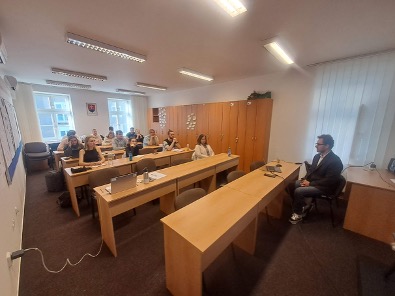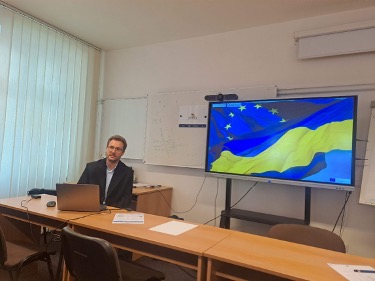Organizer: SPECTRA Centre of Excellence EU, Comenius University, within the framework of the project PM4U – Project Management for EU Urban Transformation
Partners and supporters:
- SPECTRA Centre ofExcellence EU, Comenius University, Bratislava
- AESOP Thematic Group on Transboundary Planning and Governance
- Embassy of Ukraine in the Slovak Republic
- NGO SME–Spolu (Ukraine–Slovakia SOS)
Format: Hybrid (online + onsite, Bratislava, Vazovova 5)
Overview
The event consisted of two open lectures:
- Eurointegration and Regional Development of Ukraine (September 30, 2025). This lecture explored Ukraine’s path toward European integration and its implications for regional development and governance. It situated Ukraine’s EU orientation within a broader geopolitical and historical framework, tracing the evolution from the 1994 Partnership and Cooperation Agreement to the current stage of EU accession aspirations. Particular attention was given to how EU principles—especially cohesion policy and sustainable transformation—had shaped Ukraine’s regional planning and institutional reforms, even amid the disruptions caused by Russian aggression.Through a discussion of governance challenges, policy alignment, and the strategic role of regions in Ukraine’s recovery and modernization, the lecture highlighted the mutual benefits and lessons for both Ukraine and the European Union. It encouraged participants to reflect on how Ukraine’s transformation experience could contribute to a more resilient, cohesive, and inclusive Europe.
- Modern History of Ukraine: The Path to Eurointegration (October 2, 2025).This lecture offered a comprehensive overview of Ukraine’s modern history from independence in 1991 to the present day, focusing on the nation’s evolving political identity, governance structures, and European aspirations. It examined the key historical milestones that had defined Ukraine’s trajectory toward the European Union, including the Orange Revolution, the Revolution of Dignity, and the signing of the EU–Ukraine Association Agreement. Special emphasis was placed on the resilience of Ukrainian society and institutions amid continuous external pressure and the transformative impact of Russian aggression, particularly following the 2022 full-scale invasion. By linking historical events with contemporary integration efforts, the lecture demonstrated how Ukraine’s struggle for sovereignty and democratic consolidation had strengthened its alignment with European values and reinforced the foundations for eventual EU membership.
Information about the speaker
Dr. Ivan Balykin is an Associate Professor, historian, and legal scholar with a Ph.D. in Historical Sciences and a Master’s degree in Law. He is currently a Research Associate at the Chair of Contemporary History at the University of Mannheim (Germany) and a Visiting Professor at the Karlsruhe Institute of Technology, where he teaches courses on modern Ukrainian history, European integration, and politics of memory. With over 15 years of academic and public sector experience, Dr. Balykin has authored more than 45 scientific publications and has taught in leading universities in Ukraine and Germany. His research focuses on Ukraine’s modern statehood, democratic development, and the impact of Russian aggression on national identity and regional transformation. He is actively involved in educational reform, civic initiatives, and international academic collaboration. As an expert in the accreditation of educational programs for both the National Agency for Higher Education Quality Assurance and the State Service for Education Quality of Ukraine, Dr. Balykin contributes to the modernization of Ukraine’s higher education system. He is also known for his dynamic public speaking, strategic thinking, and commitment to educational excellence.
Participants
- Total:399 registered participants
- Lecture 1 (Eurointegration and Regional Development of Ukraine):215 registered participants
- Lecture 2 (Modern History of Ukraine: The Path to Eurointegration):184 registered participants
Participation format
- Online – 377
- Onsite (Bratislava, Vazovova 5) – 22
Top represented institutions
- Kamianets-Podilskyi Ivan Ohiienko National University, Ukraine – 13
- Kharkiv Humanitarian-Pedagogical Academy, Ukraine – 12
- Kyiv National University of Construction and Architecture (KNUCA) , Ukraine – 10
- Luhansk Taras Shevchenko National University, Ukraine – 9
- University of Customs and Finance, Ukraine – 9
- Sumy State University, Ukraine – 8
- Khmelnytskyi National University, Ukraine – 8
- Slovak University of Technology (STU), Slovakia – 15
- Other Ukrainian and European universities – more than 40 institutions
Positions of participants
- Students – over 85
- Lecturers, professors, associate professors – more than 25
- Researchers, university staff and administration – over 200
Conclusions
- The lectures attracted nearly 400 participants from Ukraine and Slovakia, confirming the strong interest in the topic of European integration.
- The hybrid format (online + onsite) ensured a broad outreach and participation.
- The majority of participants were students and young researchers, yet lecturers, professors, and academic leaders also actively contributed.
- The event received strong institutional support from SPECTRA CE EU, the Embassy of Ukraine in Slovakia, the NGO SME–Spolu (Ukraine–Slovakia SOS), and the international academic community through AESOP TG on Transboundary Planning and Governance.



